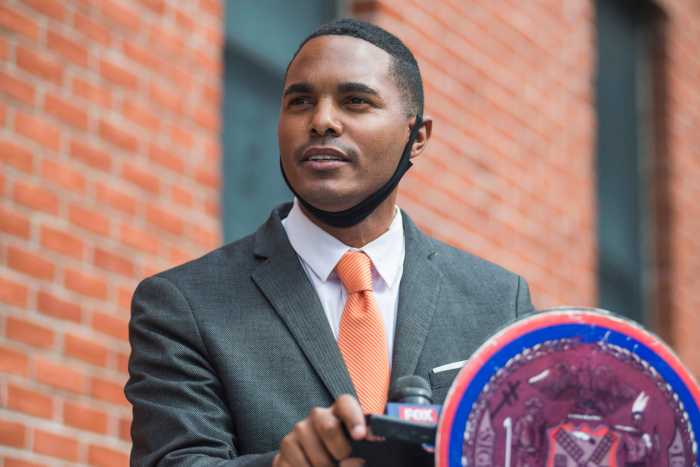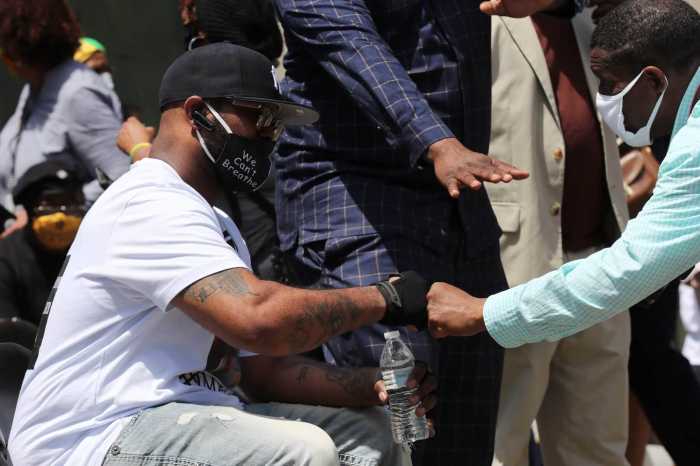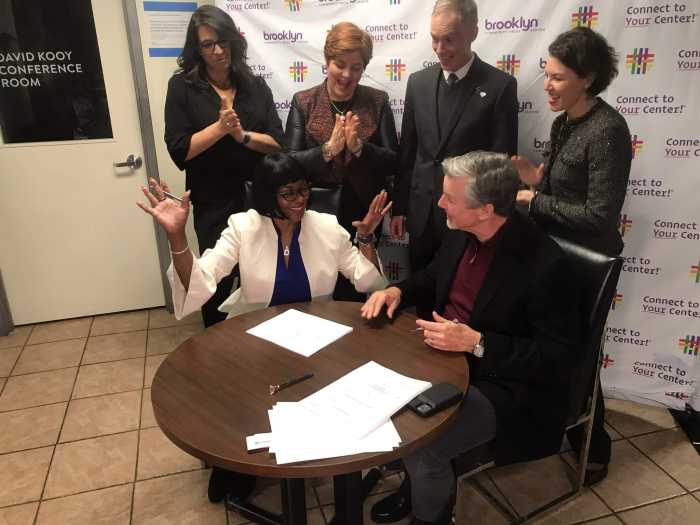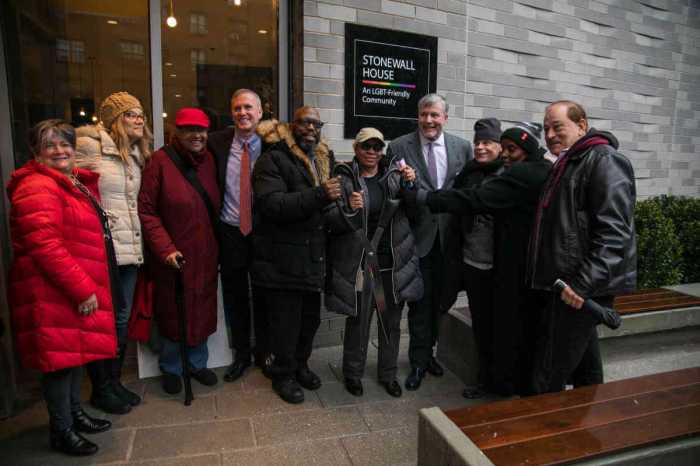Mayor Eric Adams got off to a rocky start with the LGBTQ community after he took office last year, and relations have remained strained. For a second consecutive year, multiple political clubs boycotted his annual Pride event.
Multiple factors have contributed to the tensions between Adams and the community, but one of the lowest moments came during February of last year when he appointed three anti-LGBTQ religious leaders to posts in his administration, which angered the community and brought a large crowd of activists and leaders to City Hall Park for a demonstration. One of the appointees, Fernando Cabrera — who once went to Uganda and praised that nation’s government for standing against LGBTQ rights — recently stepped down.
The mayor — who formerly served as a police captain, state senator, and Brooklyn borough president — often digs into his past to recall his time in the NYPD when he would patrol near Christopher Street and visit homeless queer youth. To his credit, he also frequently speaks of the work he did to pass marriage equality when he was in Albany.
Adams wasn’t the top choice of the main LGBTQ clubs during what was a crowded and contentious Democratic primary race for mayor in 2021, though the community supported him at a unity rally ahead of the general election that year. Now, as mayor of the city known as the birthplace of the modern LGBTQ rights movement, Adams faces greater pressure to deliver for the community.
The mayor has made inroads in the Bronx, where he held a press conference last year to announce more than $6 million in funding following roundtable discussions with LGBTQ leaders. Most recently, he signed an executive order preventing the use of city resources for out-of-state investigations into individuals for receiving or providing gender-affirming care. The Adams administration and Manhattan District Attorney Alvin Bragg also joined forces at a press conference to announce their successful campaign to apprehend suspects in a scary series of druggings and robberies — including some fatal — at gay nightlife establishments.
This Pride season, Adams has attended Bronx Pride, where he praised the work of Destination Tomorrow, and Pride festivities in Staten Island, though he did not go to Brooklyn Pride or Queens Pride. He plans to go to Harlem Pride.
During a Pride Month interview with Gay City News, the mayor said he would be attending NYC Pride this year.
“I always have had a very active schedule during Pride Month and will continue to do that,” Adams said. “It’s a combination of festivities, some events, and I’m also participating in some of the parades.”
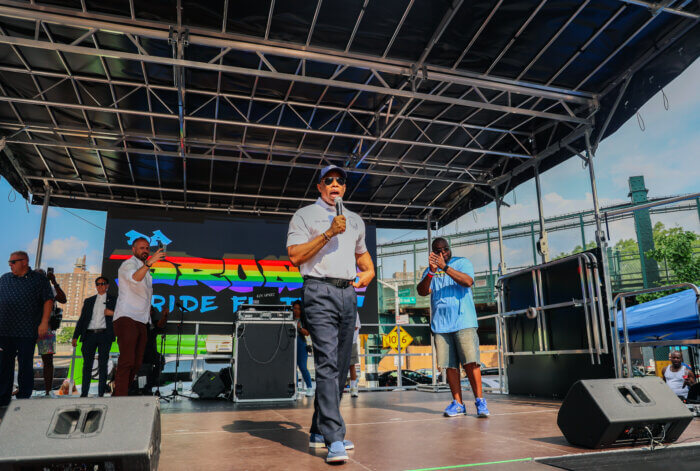
Pride Month, of course, places a much brighter spotlight on the issues facing the LGBTQ community, but some of the causes have demanded attention for much longer than one month. For years, the city’s LGBTQ community has closely watched the government’s response to the death of the late Kawaski Trawick, a gay man who was experiencing distress on an April evening in 2019 when two police officers entered his home in the Bronx without his permission. Trawick, who was holding a knife while cooking in his kitchen, repeatedly asked the officers why they were in his home, but they refused to answer, according to police body camera footage. Instead, he was tased and subsequently shot and killed by one of the officers.
The Civilian Complaint Review Board substantiated multiple allegations against the officers and said they should be fired, leading to an NYPD disciplinary trial at 1 Police Plaza. The trial hearings concluded on May 12, and it is now up to the Adams administration to make a determination on the fate of the officers.
Adams, who spoke to Gay City News just days before Police Commissioner Keechant Sewell announced her resignation, is hesitant to get involved in the case.
“It is a process,” Adams said. “We are in a city with due process, and the police commissioner will make the ultimate decision.”
Adams said he does not want to interfere with the case directly “because that opens up lawsuits,” and he said the city should “let the process happen.”
“I think it’s a larger issue that we are dealing with in our administration, and that’s mental health,” he said. “I’ve been extremely forthright about the need to have the proper response, to have police officers respond as needed.”
Still, he said, “I’m not going to tolerate misconduct on this specific issue.”
Adams’ interview with Gay City News also touched on political issues in the community at a time when the national landscape is overshadowed by the evisceration of transgender rights in several states.
“We are moving in a totally different direction from places like Florida,” Adams said. “We will ensure this is a safe haven here… The days of living in the shadows of the American dream are unacceptable.”
The Adams administration last year responded to the hostile climate in Florida by using billboards in the Sunshine State to invite LGBTQ Floridians to pack their bags and move to New York.
While Democrats in dozens of other states are forced to play defense against an onslaught of anti-LGBTQ bills, the City Council’s LGBTQIA+ Caucus is staying ambitious with a comprehensive “Marsha and Sylvia Plan” that calls attention to the needs of the queer community in the areas of education, healthcare, housing, sex work, older adults, youth, and more — including proposals to create an office of LGBTQIA+ Affairs, baseline $15 million to support non-profits providing trans-specific and affirming services, and expand PrEP and PEP services for HIV prevention.
Adams, when asked if he would support the wide-ranging plan, said yes.
“I’m excited about the fact that there are needs that are identified, including education, housing, and homelessness,” he said. Adams pointed to the importance of supporting older adults — a demographic he said is “often ignored” — and touted the city’s effort to invest millions to address youth homelessness.
“We want to improve and make sure we put our money where our mouths are,” he said.
The mayor also pushed a zero-tolerance approach to hate crimes targeting the LGBTQ community and other demographics.
“[It] sends the right message to our law enforcement officers that these cases will be investigated and not ignored, particularly around some of the domestic violence cases or bullying cases that take place.”
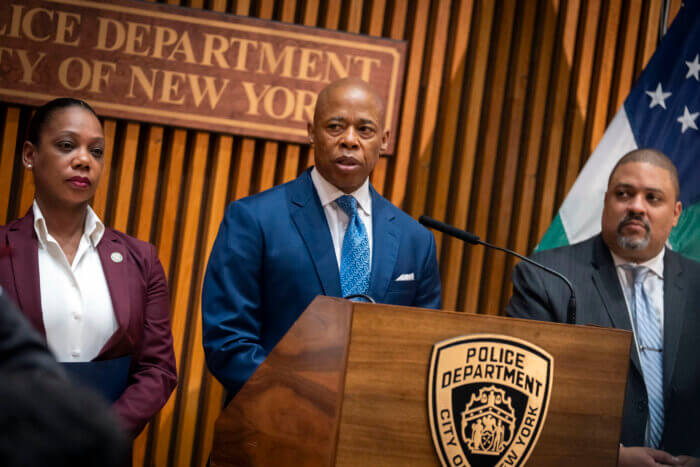
Among other issues in the community, city and state health officials are closely monitoring the state of mpox, which has recently seen minor flareups in cities like Chicago but does not appear to be spreading like last summer when it exploded on the scene and predominantly affected men who have sex with men. As of June 15, New York City has recorded 51 mpox cases this year, including two cases in the week of June 4 to June 10.
Last year’s outbreak was relatively short-lived, but the summer was messy on multiple fronts: The federal government took far too long to roll out Jynneos vaccines and the city had its own share of problems when the Department of Health and Mental Hygiene’s vaccine sign-up page experienced glitches when people tried booking appointments to get their jabs. Then, as the city opened up temporary vaccination clinics, there were concerns about racial disparities when white men took up many of the shots early on.
Once that was cleaned up, however, the city made significant strides in the effort to combat mpox. They set up mobile vaccination sites near gay sex parties and nightlife venues in an effort to, in the words of Health Commissioner Ashwin Vasan, “meet people where they are.” Vasan sought to promote a sex-positive approach to fighting the outbreak and the city invested millions to combat disparities and reach vulnerable populations.
“We had an amazing response here with Dr. Vasan,” Adams said. “Remember, we were dealing with different crises at one time — [first] COVID, then mpox came.”
Adams commended the partnerships his Health Department made to establish lines of communication with the LGBTQ community and get the vaccine in as many arms as possible. Now, however, the city is calling on people who did not get their second shot of the two-dose regimen to get their second jab as soon as possible.
“We are going to continue to be ready for these incidents to take place,” Adams said. “We must be prepared to deploy our personnel.”


